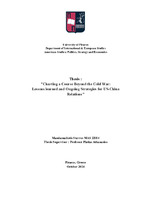Charting a course beyond the cold war : lessons learned and ongoing strategies for US-China relations

Master Thesis
Συγγραφέας
Mandamadiotis, Stavros
Μανδαμαδιώτης, Σταύρος
Ημερομηνία
2024-10Επιβλέπων
Platias, AthanasiosΠλατιάς, Αθανάσιος
Προβολή/
Λέξεις κλειδιά
Cold War ; China ; Lessons learnedΠερίληψη
The rise of China has become one of the most widely discussed topics of the 21st century, with its growing power seen as a challenge to a perceived declining United States. U.S. President Joe Biden's remark in 2021 that China might “eat our lunch” encapsulates this anxiety. China's leadership, under the Chinese Communist Party, seeks to restore its historical dominance in Asia and globally, using various resources such as military, economic, technological and ideological tools. Meanwhile, the U.S. aims to preserve the liberal international order it has long upheld, positioning itself as a counterweight to China's autocratic ambitions.
This research delves into the complex US-China relationship, moving beyond simplistic Cold War comparisons. It explores the lessons learned from the Cold War era and their applicability to the current strategic rivalry. With China experiencing rapid economic and military growth, the U.S. must balance diplomatic engagement with deterrence. The Cold War emphasized the importance of alliances, and in the Indo-Pacific, this strategy remains crucial. Additionally, maintaining technological leadership and fostering multilateral cooperation are vital for addressing global challenges and countering China's assertiveness.
By adopting a a carefully considered, historically aware approach, the United States can navigate its relationship with China more effectively, ensuring both cooperation and competition are managed prudently to avoid escalating tensions or potential conflict.


